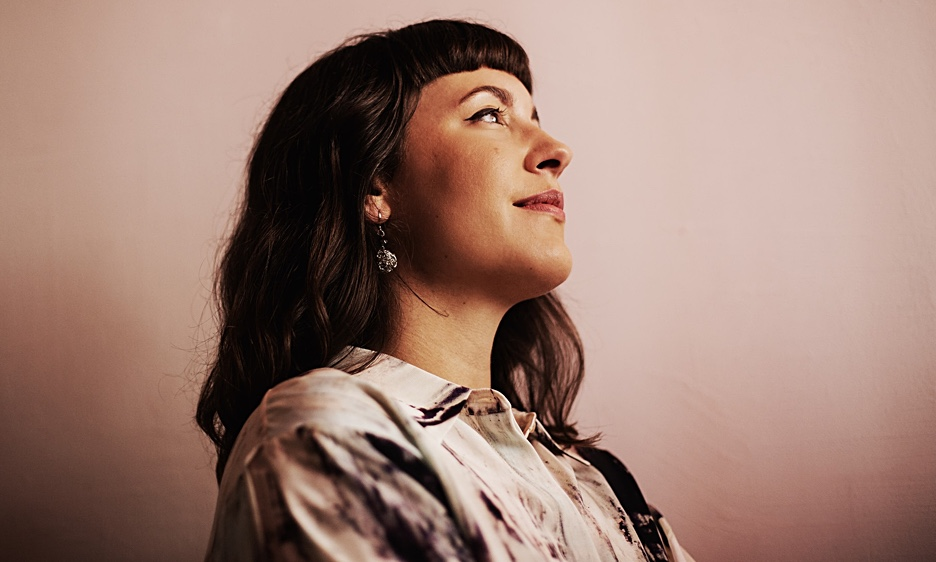Home » Jazz Articles » Interview » Mirna Bogdanović: The Art Of Confrontation
Mirna Bogdanović: The Art Of Confrontation

Courtesy Dovile Sermokas
Confrontation, released on December 18 by Klaeng Records (an independent label from Cologne), does not feel like a debut: the album shows a mature musical philosophy and Bogdanović's voice holds a recognizable identity. The album is rooted in jazz while creating intense dialogues with electronic and pop music, or solemn connections with classical music. This dialectic between opposite styles keeps a sense of balance, of lucid harmony. While the interaction between genres, in itself, is not an innovation, her way of narrating these encounters and clashes between diverse traditions, certainly is. The vocal and instrumental parts proceed together almost organically, and then they ignite suddenly. There are no clear boundaries, the space is open, ready to welcome more. It is a far-reaching movement, where not everything is understood, or at least not always. Like in our lives, it is up to us, in the end, to grasp the meaning.
All About Jazz: You have a conception of jazz that runs off the beaten path. In your music styles are fluid and blend together, you reject preconceived notions and choose to follow absolutely personal direction. What is your musical philosophy and what is jazz for you?
Mirna Bogdanović: For a very long time I have focused mostly on the jazz tradition, because I've always believed that you first have to learn the basics before doing anything else. While I was dedicating myself to that, I'd still listen to a lot of different genres of music that were out there. And once it came to writing my own music, I just let whatever was there come out. I still practice and perform songs from the Great American Songbook on a regular basis, because first, I love the music, and second, I feel like I become a better musician by doing it. It gives me great tools when approaching any other kind of music. For me, jazz is a language and a form of art. I am learning from it and I will be learning from it for the rest of my life. Because you can always draw so much from jazz. It's the highest form of music, next to classical music of course. And yet jazz is special because it's still alive and constantly evolving. My whole approach to music comes primarily from jazz—my phrasing, sound, harmony and rhythm. I would never have truly been able to understand music without getting into jazz.
AAJ: How did your passion for music come about?
MB: I was a very extroverted kid, always dancing, singing, painting and wanting to perform all the time. My dad plays guitar and sings, so there was always a lot of music around me growing up. At some point, our neighbor was a piano teacher and persuaded my parents to let me join her music school. Later on, I became part of a few rock bands before going deeper into jazz.
AAJ: You started by playing classical piano and later approached jazz singing. Why did you decide to focus on singing?
MB: Classical piano was my main thing for half of my life. I was aware though that I didn't have many chances of succeeding as a concert pianist. At the same time, I always loved singing and I was slowly getting into jazz. During my first year of studies, in fact, I enrolled in two music colleges—piano in Ljubljana, Slovenia and jazz singing in Klagenfurt, Austria. That resulted in a burnout. So I had to make a decision and jazz just made more sense.
AAJ: After your education in Bosnia and Herzegovina, you went to Austria at the Conservatory for Jazz and Pop in Klagenfurt and then to Germany, where you finished your studies at the Jazz Institute in Berlin, the city where you live today. What were these years like and how did you develop musically and as an individual?
MB: I was actually born in Bosnia, but my family fled the war in Sarajevo when I was only 2 years old. We moved to Slovenia where I grew up. Afterwards, as mentioned above, I studied in Ljubljana and Klagenfurt. After that crazy year, I moved to Klagenfurt and lived there for two years. During the first, I tried to relax and not beat myself up if I didn't practice 10 hours a day. During the second, I started practicing properly again and preparing for the admission exams in Berlin. At the time it all still seemed like a crazy life decision to actually want to study jazz, since I grew up in an environment with basically no jazz tradition. My life changed completely when I moved to Berlin, a big open-minded international city with a great jazz scene. Jazz Institute was such a great school at the time so it really shaped me as a musician and a person. There, I was suddenly a small-city girl in a big city, studying jazz at an international school, full of talented young musicians and great professors. When I first arrived, I had no idea that, one day, I would write my own music. My taste in music changed a lot too. I guess one could blame the Berlin jazz scene for that.
AAJ: You studied with Judy Niemack, Kurt Rosenwinkel and Greg Cohen, who is well known for his work with Ornette Coleman, John Zorn, David Byrne, Laurie Anderson, Anthony and the Johnsons and many others. He has expressed admiration for you. What is his greatest teaching that you carry with you?
MB: A few professors from the school, including Greg, took the opposite of a "jazz school" approach to teaching, even though they were part of the jazz education system. That was quite eye-opening and refreshing in an environment one can easily get lost in. With Greg, it was more about intention and meaning, rather than playing all the right notes or simply focusing on the theory. It was something deeper, it gave all the students a sense of purpose in what we were doing.
AAJ: Your debut album Confrontation showcases your capacity to balance various influences. Why did you choose this title?
MB: I chose that title because, while people usually prefer avoiding confrontation, I'm different. I think that, in many aspects of life, confrontation is very important, from personal relationships to music. Perhaps this is due to my Balkan roots: I grew up in an environment where people were not afraid to say what they meant. Wolf Kampmann, the German music journalist, wrote something about my music, which I think describes it pretty well: "Vocal and instrumental, individual and collective, real-time and post-production, perception and reality -there are many confrontations on this album. Mirna Bogdanović can withstand not leveling every contradiction or resolving every paradox. Because life is not what we want it to be, but life is what it is."
AAJ: You recorded Confrontation together with other musicians who are active on the Berlin jazz scene, including other vocalists, such as Pauline Peek and Dora Osterloh who added more layers to the compositions. How did the project come about and how did you work together?
MB: With this album I was trying to discover the role of a singer and vocal group in a band setting. I started writing the songs while studying in Berlin, preparing for my final concert. I wrote a few vocal arrangements: at times the 3 vocals are equal, other times I take the front while Pauline and Dora sing backing vocals. In the song "Patterns" we create a sort of carpet, replacing the instruments, while the instrumentalists are soloing over it. Then there are a few typical "singer" songs, with lyrics and me in the front, and a few others where my voice is doubled by the saxophone, which leaves a lot of space for improvisation/instrumental parts. We played around with all the different possibilities the voice can have. I just felt like I wanted to write a very colorful album, neither strictly instrumental nor simply vocal.
AAJ: So how did you work on the vocal and instrumental parts?
MB: I wrote all the vocal and instrumental parts either prior to the rehearsals, or based on ideas we had while rehearsing, adjusting along the way. It was a big learning process for me, since I haven't done much of that beforehand. The real challenge was to combine all of the instruments with the voices and leave enough space for both. The whole band came up with great ideas as well, especially Wanja.
AAJ: How was the collaboration with the musician and producer Wanja Slavin?
MB: I always wanted to work with Wanja, because he's such a versatile musician, not only an amazing saxophonist, but also an extremely talented composer, producer and arranger. In the studio, he helped me guiding the band, producing the whole thing, recording all sorts of instruments and coming up with great arrangement ideas. But the real work began after the recording session was done. We basically spent the whole summer of 2019 in post-production: we added layers of electronics, cut out certain parts and replaced them with the synth. Alternatively Wanja would record some more woodwinds, percussion. In the track "Cold Lake," he cut all instruments but the drums and voices, replacing it with electronics. In the very last part instead, he went back to the original studio recording. I could say that this album is as much mine as it is his.
AAJ: In the album we listen to a contemporary sound, in which pop, electronic and classical music openly compare with traditional jazz, ready to welcome these continuous pushes towards the search for something different. How did you manage to find this balance?
MB: I think it is due to the many years I spent playing classical piano while listening to all the different kinds of music I loved so much. All of that was stuck somewhere in the back of my head: It sort of mended together because it was simply waiting to be set free. When I was writing the music for the album, thus, I decided not to think too much about the rules I've learned in jazz school. Rather, I followed my instinct and wrote the sounds that felt good to me. Luckily, I did listen to a lot of jazz through the years, so some of those "rules" I learned in school came out anyways.
AAJ: What does it mean to be a female musician in the jazz world today?
MB: I think there's a bit of a difference in being a female instrumentalist to being a female vocalist. There's still a certain pressure to prove yourself to the male instrumentalists, but that kind of experience can make you stronger if you know how to use it to your own advantage.
AAJ: What are your plans for the future and what would you like to do as soon as this pandemic is over?
MB: In the next 6 months, I am going to focus on learning how to work with music software programs. I want to write, record and produce music on my own, to become more self sufficient. I've just received a grant for that, so I am very excited about it. Hopefully I'll have enough songs till June to go back to the studio and record my second album. I would of course love to plan a tour with my band, but the situation with the pandemic is still unclear, so I'm not sure how much we'll be able to play. I hope there will be opportunities for that soon!
Tags
Interview
Mirna Bogdanovic
Serena Antinucci
Italy
Rome
Judy Niemack
Kurt Rosenwinkel
Greg Cohen
Ornette Coleman
PREVIOUS / NEXT
Support All About Jazz
 All About Jazz has been a pillar of jazz since 1995, championing it as an art form and, more importantly, supporting the musicians who make it. Our enduring commitment has made "AAJ" one of the most culturally important websites of its kind, read by hundreds of thousands of fans, musicians and industry figures every month.
All About Jazz has been a pillar of jazz since 1995, championing it as an art form and, more importantly, supporting the musicians who make it. Our enduring commitment has made "AAJ" one of the most culturally important websites of its kind, read by hundreds of thousands of fans, musicians and industry figures every month.






















